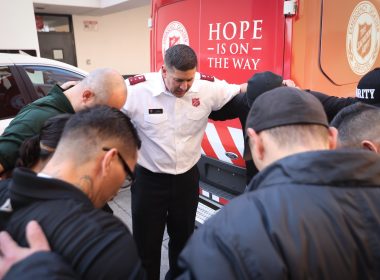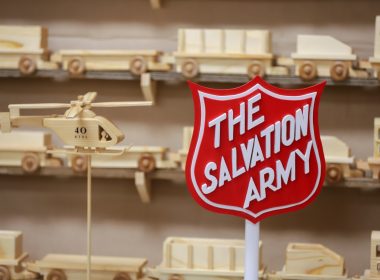Bridgeway and Lifeboat Lodge Programs

By John Docter –
In the heart of San Francisco’s impoverished Tenderloin district, in a converted 90-year-old hotel on Turk Street, two Salvation Army programs provide a vital service to the community.
A/Captains Patrick and Kitty Granat oversee the work at Bridgeway, a transitional residence for individuals graduating from substance abuse recovery programs, and at the Lifeboat Lodge, a late-night homeless shelter for men. The Granats are also pastors of the Turk Street Central Corps, which meets in the same building.
Bridgeway Residence
The Bridgeway Residence opened on Turk Street in 1974 when five graduates from the Harbor Light Center moved in.
Today, the residence is filled to capacity with 112 men and women living there. Each resident has been referred to the program by a counselor following their completion of a full three month recovery program such as the Harbor Light or ARC.
“[Bridgeway] has a 65 percent success rate,” Granat says, “meaning that a year after residents leave they’re still clean and sober, and living independently.” He estimated that Bridgeway has impacted hundreds, if not thousands of lives over the years “dramatically bringing them out of street level drinking and drug use.”
The residents–85 percent of whom are men–work or go to school, pay a small rent based on a sliding scale and live one or two per room. About one quarter attend either worship services downstairs at the Turk Street Corps or one of the corps’ Bible studies. All the residents are also involved in ongoing counseling and a peer-advisor program within the Bridgeway.
Cathy Cirul has been able to finish school and learn valuable job skills since moving into Bridgeway two years ago. She has also joined the Turk Street Corps where she is secretary of the corps council.
The program has sent her confidence and self-worth soaring. “Before, I was just a drunk and a dope addict. Now, I’m a Christian and here in The Salvation Army,” Cathy says. “I’m actually a new person since I’ve been here.”
When people move into Bridgeway, most bring little more than a suitcase, Granat says, “but because they get their act together while they’re here and are able to start purchasing household items and furnishings, by the time they leave they have to get friend to come over with a truck. So this is like Christ changing the water into wine except here we change beer into furniture.”
Lifeboat Lodge
Shortly after Bridgeway opened on Turk Street, workers broke through a wall while making renovations to the building and discovered a large, sealed- off room on the first floor. The space, thought to have been a speakeasy during prohibition, was quickly transformed into the dormitory, Lifeboat Lodge Emergency Shelter for Men, or, as it’s known on the street, the “Hilton Hotel.”
Each night, 86 homeless men receive a meal, a shower, and, most importantly, a clean and secure environment in which to sleep. “If you’re on the street it’s important to know that the guy next to you doesn’t have a weapon, is not going to be doing drugs, or smoking in bed because all personal items are stored before people enter the room,” says Granat.
Men are referred to Lifeboat after other shelters in the city have filled up. Even so, according to Granat, the Turk Street shelter still has to turn people away virtually every night.
Joey, 31 and homeless, speaks highly of the Army’s work in the Tenderloin. “The Salvation Army goes to every length they can to help us out, he said. “The people who work here are full of compassion. They’re just all around fantastic people.”
Most of the year the shelter is open only at night. During the recent El Niño storms, however, it has also functioned as a day drop-in center where the homeless can escape the frequent downpours.
In addition to the regular day-to-day shelter, Lifeboat Lodge has a small case-managed component for 11 of the beds. Men in this program live in the shelter an average of 90 days while they try to redirect their lives. According to Granat, that’s where some of the most dramatic success stories have come from and he would like to see this type of program expanded to the whole shelter.
For example, in just the past three months, one man entered this program, cleaned up his act, went to chef school and wound with a full time job paying $12 an hour, “which is a good step up from homelessness,” says Granat. “He told us the real motivation was that he knew the captain was praying for him to succeed.”










